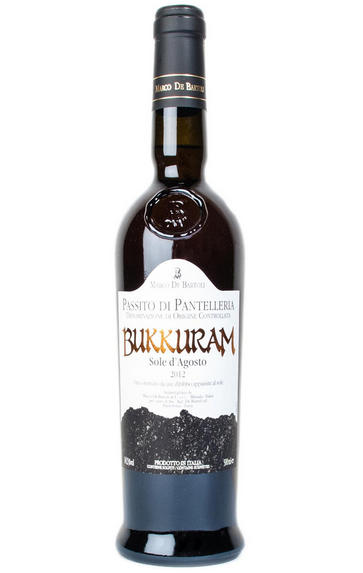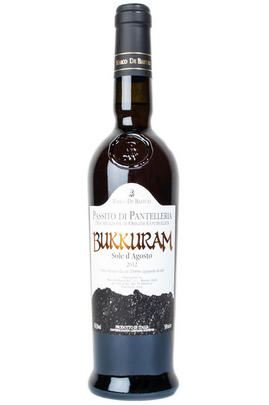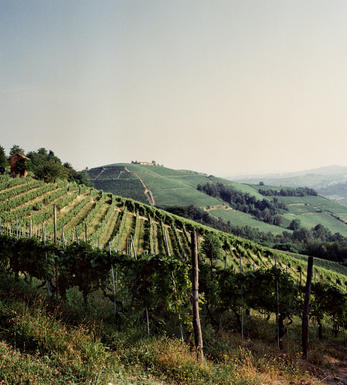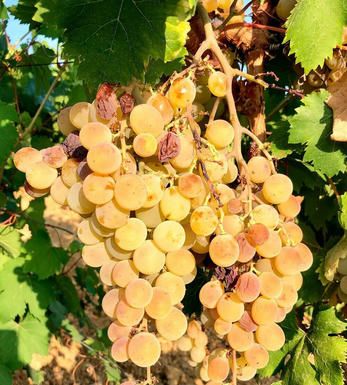
2012 Bukkuram, Passito di Pantelleria, Sole d'Agosto, Marco De Bartoli, Sicily, Italy

About this WINE

Marco De Bartoli, Sicily
Marco De Bartoli seems to have single-handedly restored (rescued?) the good name of Marsala, two hundred years after the British put it on the map (and before the Italians reduced it to a mere cooking ingredient). The 20ha family baglio (cantina/winery) close to the Sicilian town of Marsala is now also producing a range of sweet passito, fine dry white and excellent sparkling wines.
Scion of two industrial producers, Pellegrino and Mirabella, in 1978 Marco De Bartoli chose the lonely route to quality, deciding to grow and vinify the fruit himself in-house. To re-inforce this message he launched their flagship wine: ‘Vecchio Samperi’, named after the location of their baglio/farm, ‘Samperi’: a 100% ‘perpetuum’/solera aged 100% Grillo wine, it’s an original ‘Marsala’ made without fortification or the adding of ‘mistella’ (caramelised sweetner), perpetually racked to produce a fine, dry, delicate ‘rancio’ style wine. Alongside, De Bartoli also produces a range of classical, English-style, quality Marsala Superiore Riserva, from his own vineyards, using only Grillo (for quality) and not adding Inzolia or Catarratto (for quantity).
His children, Renato, Sebastiano and Giuseppina have now succeeded their father, continuing along the path of quality, but their campaign is to further promote Sicily’s autochthonous (indigenous) grape varieties (in the face of the sea of international ones), notably local Grillo, Zibibbo, Catarratto and red Pignatello (Perricone), through dry still and sparkling wines (the latter called ‘Terzavia’ in reference to the three ways in which Grillo can be vinified: oxidative, still white and sparkling!)
And since 1986 they have been producing a sweet Passito on the island of Pantelleria, close to Tunisia. Here the family own 8ha of Zibibbo vineyards (Muscat di Alessandria/Canelli) at the contrada/frazione of Bukkuram, making only a couple of thousand cases a year.

Marsala
Historic fortified wine style of the Marsala zone, in the west corner of Sicily, whose reputation was built by the British during the mid-18th century, fresh from creating Port, and keen to have options as they fought Bonaparte! British merchants would tour round the small artisan producers of white wine from the Grillo, Catarratto and Inzolia grapes, who would keep their wines in botte grande for years, waiting for the knock on the door. These would then be blended together in a solera (‘perpetuo’) system and, if necessary, fortified with acquavite prior to beginning its journey to England.
The quality industry was taken over by the new fledged Italy in 1870, led by the likes of Florio, but then subsequently ruined by the large Bourbon estates, who, after WW2, turned it from a high quality, artisan product – a stravecchio wine – into a volume product, adulterated with ‘mistella’ (grape concentrate and brandy). The rise of the cooperative movement (‘cantine sociale’), along with the fashion for sweet carbonated drinks (eg Coke), exacerbated the problem. Marsala became an industrial product, and preferred cooking ingredient. But since 1978, Marco De Bartoli has led a counter-revolution to restore the good name of Marsala by using wine made from his own estate.
Marsala is classified into three styles: Vergine (the finest, aged for 10+ years, fortified but without mistella); Superiore (the middle level, the ‘British style’, aged for 5 yrs, with added ‘mistella’ and fortified) ; and lastly Fine, aged for 2 yrs, mistella added and fortified)
Marco De Bartoli is regarded as the region’s top quality producer, making wines that echo those of their heyday. His flagship wine is Vecchio Samperi: a ‘stravecchio’ wine in the original, authentic style of Marsala, made without ‘mistella’ or fortification.
Recommended Producers: Marco De Bartoli

Zibibbo
Zibibbo, also known as Muscat of Alexandria, belongs to the broader Muscat grape family and is renowned for its aromatic qualities. While it shares its heritage with other Muscat varieties, Zibibbo has unique characteristics and is still cultivated in several wine regions worldwide.
The variety is grown in various wine regions, including Australia and South Africa, where it thrives in warm climates. Additionally, it has a presence in the wine regions of Samos in Greece, the island of Pantelleria in southern Italy, and sweet wines produced around Málaga, Spain. In Spain, it is sometimes blended with Pedro Ximénez grapes.
While Zibibbo may have less aromatic intensity than Moscato Bianco (also known as Muscat Blanc à Petits Grains), it is still highly aromatic. It is noted for its delightfully fresh grape aromas and sweet overtones. These characteristics make it a valuable grape variety for producing aromatic and flavorful wines.
The variety’s versatility is reflected in the different styles of wine it can produce. It is considered prime material for sweet wines, where its natural sweetness and aromatic profile can shine. It is often used to make sweet dessert wines. Additionally, it can be used to produce steel-fermented dry table wines, which showcase a different side of the grape’s character. Less frequently, Zibibbo is also used to make spumante, a light sparkling wine.


Buying options
Add to wishlist
Description
The flagship wine of Pantelleria, the volcanic island located between Sicily and Tunisia, where the De Bartoli has been involved since 1983, buying an eight hectare estate, Bukkuram, in 1994. Sole d'Agosto was first made in 2011 by Marco De Bartoli's second son Sebastiano. It is an unfortifed, naturally sweet wine in the style of Vin Santo, whereby the Zibibbo (Moscato) fruit has been naturally dried (passito) under August skies on the vine, part shrivelled on the black lava rocks. Picked slightly early (for zip), fermentation and maceration (of both sources) takes around 20 days, followed by a further 12 months in both inox and French oak. The result is a wonderfully bright, brilliantly Muscat perfumed wine that's fresh as well as sweet (circa 140 grams of residual sugar). It's got all you'd hope for from a Pantelleria Passito, while being full of energy, young and eager. It rings clear with mandarin and clementine fleshiness – there's a real sensation of freshly-squeezed orange fruit, along with shrivelled peel. Only 1,000 cases made each year. Delicious with creamy pastries.
David Berry Green
wine at a glance
Delivery and quality guarantee